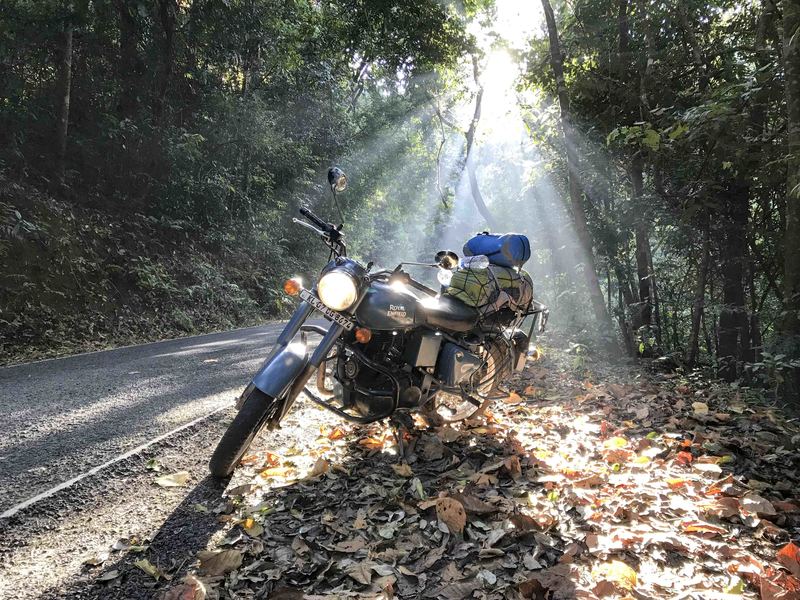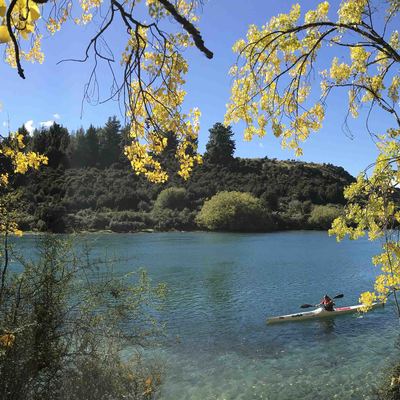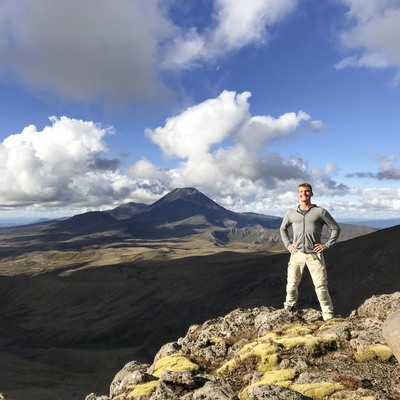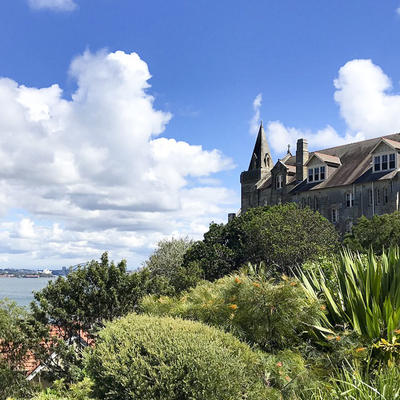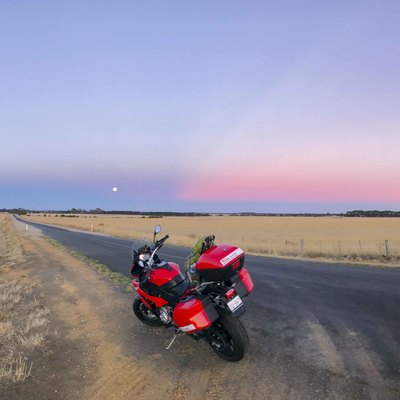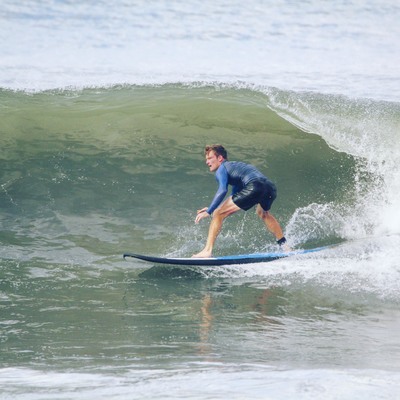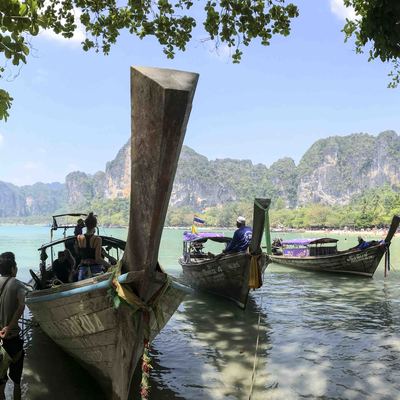Kerala: God's Own Country
I looked forward to Kerala during almost every day of the trip so far. The southernmost state in India is known for its beauty and I was more than ready for it.
Kerala is nicknamed "God's Own Country". Riding in a car from the airport to the city of Kochi, I was immediately struck by the difference between this final state on my itinerary and those which had come before. The roads were by no means perfect, but it took me a long moment to realize that they were almost, well, clean. I saw traffic direction being done by female police officers driving bright pink cars, something which would have seemed culturally out of place anywhere else. Overall, I couldn't shake the impression that Kerala was clearly the less crowded and wealthier cousin among nearby states.
According to the Human Development Index, Kerala has the highest HDI (.712), literacy rate (93.1%) and life expectancy (77 years) of all Indian states. Filled with abundant growing land and gorgeous tourist destinations, it has done very well relative to the rest of the country.
The next morning, I attended an Indian cooking class, learning how to assemble a creative meal by studying the first principles of each spice's core properties. The class was held in the cook's home, where family meandered in and out regularly. A trip to the bathroom bypassed a group of family elders who sat silently astride a bed and gazed blankly ahead like mute statues. It was honestly a bit unsettling and I'm not sure what to make of this behavior, which I'd seen from afar a few times before but never up close.
Elder care is a challenging issue for any country but India clearly has its own dynamics at play as well. 65% of old people are poor with no known source of income, making them entirely reliant on their families to care for them. Luckily, India has a strong family culture but the increases in geographical mobility of the 21st century are reducing this support net as children move to seek their careers elsewhere.

I love riding Royal Enfield bikes because they are clearly perfect for the kinds of roads you see in India. They emit a satisfyingly throaty rumble and carry classic cruiser styling while taking on the torn up roads as comfortably as any off road bike.
To be clear, I love riding them not fixing them. Unfortunately, they aren't the most reliable and I had serious alternator/starter problems with every single one I hired. In Kochi, it was a blessing in disguise because it allowed me to switch out a beaten up Bullet (which had clearly been borrowed from an individual with a phone call for the right price) and upgrade to a beautiful 500cc with classic styling. It was well worth the knee bruises from fighting with the kick lever.

I hit the road, excited to get out into some mountains at last. Several hours of traffic were brutal as always, but eventually the roads opened up a bit and I was able to enjoy the ride into ever-thickening forests. Winding slowly upwards into the lush rainforest of the Western Ghats, I stopped off at Athirappilly Falls and joined hundreds of tourists and monkeys in appreciation for their flow.

Comfortably settled into the flow of travel and looking forward to the warm bed I had booked several hours ahead, I wasn't expecting anything unusual when I pulled up to the forest service checkpoint before the Sholayar Reserve Forest. So I was rather surprised to find the way barred before me. Seeing a handful of jeeps let through without issue, I demanded to know why I wasn't being allowed to pass. The guards apologetically informed me that the elephants in the reserve had been known to attack motorcycles so they weren't allowed through after 4pm (no one was allowed through after 5:30pm). Try as I might, there was no bending and I was forced to scramble for accommodation on this side of the checkpoint.
I couldn't (and still can't) figure out if this was true or a justification for stopping tourists to boost local commerce. Neither or both would surprise me.

Despite the delay, arriving at the gate right when it opened at 6am alongside several other motorcyclists provided an unexpected treat of a ride. The mists rose slowly as I ascended, passing still-steaming piles of elephant dung strewn across the road and listening to the resonant chorus of morning birdsong. Whether elephants or weather, several trees were down across the road and required some creative off-roading which likely wouldn't have been possible had I not been the only person on the road.
I couldn't recall a single time in India where I hadn't been required to be hyper-vigilant while riding so the chance to surf the open road was pure bliss. When the late morning light hit perfection, I couldn't help but stop for an impromptu photo shoot. The creative fulfillment was restorative in a way few things can rival.

Already smiling ear to ear, I emerged from the trees atop a ridge line into Malakkaparra and my jaw dropped. That quickly, the surroundings changed from the motleyed colors of deep forest in late morning to an above-the-clouds dreamscape of verdant tea plantations baking in the sun. The neat rows of thick bushes which crowned the rolling hilltops were hand-tended by an army of farmers who bent over and chatted while they worked to prune and pick leaves.

Though I had many hours ahead, I couldn't help but slow down and soak up the landscape in a state of extreme presence which is rare enough to warrant respect and wonder.

I passed alongside the massive Sholayar Reservoir and stopped in the town of Valparai, where I'd intended to stay the night before. There was some sort of weekend celebration going on at the local temple but I couldn't figure out what it was.

My descent into the low country of Tamil Nadu navigated hundreds of zebra-framed switchback curves overlooking the valley below. At this point, I was concerningly unconcerned about initiating fast passes of the buses and trucks which crawled their way precariously along the rim. Monkeys perched atop the guard walls and ate from their fruit caches without a care for the antics of the humans who courted danger at every curve.

The detour through the lowlands was a chance to ride fast through the tunneled green of palm plantations on the way to the Anamalai Tiger Reserve. A part of me was concerned about riding alone through a place which actively encouraged 600lb predators endowed with a fearsome reputation but I didn't see any as I passed between hills crowned by lookout towers and reascended into the blessedly cooler hills of Munnar.

The mile-high Munnar hill station is surrealistically beautiful. It's a cross between the mist-wreathed hills of Jurassic Park and the epic quaintness of Lord of the Rings.

Mountain tops jut steeply upwards at the fringes but the hills which drape their seams are gentle and rolling. Where a similar scene at a more extreme latitude might be dotted with sparse copses of pine and fir, the equatorial heat and frequent misting rains allowed for more broad-leafed trees to frame the diligently tended rows of tea lined up like dwarf soldiers at muster.

Near the rivers, life springs forth with brilliant intensity. It was bewitchingly photogenic.

Exhausted and sore at the end of a very long day but deeply fulfilled, I eventually wound my way into a valley, had a thali meal amidst the uncurious crowds of local laborers and stayed the night at a homestay overlooking the river.

The following morning, I decided I needed to get some exercise and figured the best way would be to hike the highest mountain in the area, called Chokramundi. Somehow it seemed like a good idea to skip breakfast and leave before any store was open to offer a water replenishment for my diminishing collection of bottles.
Despite detailed sleuthing on Google Maps, I knew only that there were a few faded trails to the top and that they would be very difficult to locate. So I set off on the motorcycle and followed the first group of jeeps who looked like they knew where they were going towards the mountain.
As it turns out, 4x4 off road vehicles can handle more abuse than a humble Royal Enfield. I hung with them as long as I could while they slowly crawled their way up the washed out rock-strewn paths which pushed upwards along the hillside. Eventually, though, it became just a matter of time before I got beached on a rock and tipped over so I called it quits and stashed the bike in an accommodating family's driveway.
The families who lived on the mountainside and tended the cardamom plantations generally didn't own vehicles of their own. To get to town, they packed everyone into a 4x4 taxi and braved the bumpy, slow crawl there and back

Not comfortable leaving everything I owned with the bike, I continued onwards with my full pack, trudging up the "road" on foot. The path quickly became difficult to navigate and I found myself meandering among the cardamom and palm, choosing intersections by what had the steepest incline upwards.

Eventually, I reached the end of a vehicle track and followed a garden hose through the woods and onto a plateau above the trees. Catching the ghost of a trail, I fought my way upwards while the sun rose higher and my stomach rumbled unhappily. Clear that I'd underestimated the task above, I stubbornly pushed onwards.

I reached the first false peak after a vicious fight with tough bushes when the path disappeared and I almost gave up. But a quick rest rejuvenated just enough of my motivation that I grudgingly continued the fight upwards.

It was rough going. I got a face full of dirt when I fell down the same chute twice. When I reached the second peak, now sunburned, exhausted and famished from the effort of scrambling up cliffs with a full pack on, I realized it was also a false peak. Sitting down with balked fury, I rage quit and resolved to end the foolishness.

But again, glaring upwards made it seem just doable enough that I stumbled up and leaned into the hill to continue. Pure bushwhacking, this required hand-over-hand climbing towards sunlight. I had to rest frequently to stop my legs from shaking and the third false peak elicited only a defeated collapse.
Late morning atop a random mountain in India was a strange time to summon inner demons but I drew on everything I had to motivate me to rise again and take on the last leg. I could only take baby steps and weaved from side to side like a drunk octogenarian but gradually approached the summit. The way crossed steep traverses along pancake-flat rock faces and I eventually ended up crawling on hands and knees.
The steepness of last push over the summit's crowning boulders wouldn't even allow that much and I had to climb, hugging the rock like an exhausted castaway on a barrel. I used arms, legs, and chin to inch my body upwards, keenly aware that the perilous friction of my t-shirt was the only thing preventing me from sliding back over the edge.
My arrival at the top was hardly cinematic material. I panted and flopped like a beached whale while I collected strength back into my trembling limbs. Cautiously, I gathered my knees under me and rose one last time to see what I had accomplished.

The crinkled scar of mountains stretched to one side while the other lay shrouded in a mantle of cloud that merged seamlessly with the far horizon. Best of all and unlike anywhere else I'd been in India so far, it was completely and utterly quiet. Despite my thirst and dismayed by the mangled and irrecoverable mess the ascent had made of my only banana, I stayed for some time and settled into the peace of the world above the clouds. I rested, meditated and eventually sang into the wind for the sheer thrill of it.

I don't remember much of the descent because it was undergone with pure mechanical determination to keep the body moving. I was in a dizzy trance of left foot, right foot that eventually took me back through the jungle and to a motorcycle I was rather surprised to discover undisturbed. Chokramundi had thoroughly kicked my butt and, after another harrowing descent of the four-wheel track, I gratefully returned to town and tended to my body's needs.
In desperate need of some good rest, I booked a decent hotel and passed out as early as I could... only to be awakened at 5am by the roar of nearby loudspeakers blaring unimaginably awful and repetitive religious music. Dazed and confused, I endured the barrage on everything decent in the world and raged about the inconsiderate cultural norms that allowed such an affront on civility.
"Religion by loudspeaker," though technically illegal, is actually quite common. There are numerous multi-day Hindu festivals through the year which kick off before dawn each morning with music played as loud, far, and wide as possible. Speaking with local business owners, they acknowledged that it was disruptive to their business and that tourists hated it but that, if they spoke out, the collective weight of the religious community would crush their businesses so they had to endure.
Wanting to escape this torture as quickly as possible, I mounted up and started on the long way to the Vagamon hill station. The route took me through the heart of the Western Ghats, verdant mountains which boasted such a diversity of life that 25% of the world's species are represented there.

The ride into Vagamon, though it passed along a similar procession of tea gardens as had the road to Munnar, felt somehow less touristy and more genuine. Perhaps it was the fact that the tea plantations were less commercially identical to each other and were more often flanked by the small huts of families who tended them. Regardless, the ride was a pure pleasure and I rolled into the Kissing Mountains Homestay right at sunset and basking in the glow of a great day's ride.


Despite another morning which saw me disturbed before dawn by the boom of loudspeakers echoing off the surrounding hillsides, I enjoyed the peace of Vagamon so much that I stuck around for an extra day. It gave me a chance to catch up on some of my digital responsibilities, do some deep journaling and also do my first ever paragliding experience.

One piece of advice -- when the pilot asks "are you comfortable if we do some spirals?" responding with "I can handle anything you can" is asking for trouble. Needless to say, the second half of my flight saw me dizzy, green and desperately wishing for the end of life as we know it. Lesson learned.

Chatting with the owner of the Kissing Mountains during the evenings and making dinner together with his team really fostered a sense of belonging and I would have loved to stay in the hills of Vagamon for longer but had a date with the Kerelan coast that couldn't be missed. So I descended from the tranquility of the Western Ghats and back into the complete chaos of coastal roads. Just 210km later and it felt like I'd gone 12 rounds with Mike Tyson.

Kovalum beach was definitely a change of pace. Known for the lighthouse which stands sentinel at one end, it had the blend of locals going about their lives like they had for hundreds of years and tourists visiting on myriad missions of self-exploration that I'd come to expect from Indian beaches. With only an evening, I swam out for a time to tread the warm water among the surfers in the lineup and grabbed a beer at a restaurant which overlooked the teams of fishermen who worked for the better part of an hour to reel in an enormous shore-based net.

The next day in Varkala, a chance interaction with a young woman in a cafe resulted in an unexpectedly deep connection. She was a Reiki healer from Russia who had traveled to India for an Ayurvedic retreat and escaped to rebel against the strictness of their schedule. She provided my first experience with Reiki right there on the beach, surrounded by the crash of waves and caked with the sticky film of drying salt water.
Content to extend the moment, we passed hours in conversation, exploring the edges of Self. Eventually, the sun settled low and time returned to the bubble we'd created and we parted with simply "I'll see you in another life".
Reiki is an alternative medicine practice which uses the hands to transfer energy between the practitioner and the patient. I certainly can't attest to its effectiveness as a healing tool but the process creates a surprisingly intimate connection between people.

My final stop along the coast was in Alleppey, a town known as the "Venice of Kerala" because of the canals which cut across the center and extended into the backwaters. At my homestay for the evening, they made the usual hand-crafted meal but included peppers which had been pulled from their own garden and dried on site.

For my final morning, I did one of the most touristy things so far by hiring a boat to bring me through the backwaters. Some of the houseboats are massive hulks that crawl along like giant wooden beetles while others are much smaller single-family affairs. All are colorfully painted but suffer from various stages of the endless fight against the rot induced by tropical climate.

The owner of the small taxi I hired for the morning let me sit atop the roof like an old world explorer surveying new domains. It was peaceful to pass through the canals and among the islands of the backwater. After weeks immersed in local culture, I was hardly surprised when we docked with his brother's boat and transferred some new passengers aboard while they both worked to fix a smoking engine.

While there were certainly a number of modern homes clearly catering to tourists along the way and we waved to all the other boats that traveled a similar path, passing through the backwater still felt like floating in slow motion through a film of a different age.
 Along the shores, men bathed naked and kids ran along the stone walls. Women did laundry directly in the water while seated next to giant baskets. The rural lifestyle seemed little interrupted by the path of technological progress.
Along the shores, men bathed naked and kids ran along the stone walls. Women did laundry directly in the water while seated next to giant baskets. The rural lifestyle seemed little interrupted by the path of technological progress.

My time in Kerala was drawing quickly to an end, which was a good thing since the motorcycle would no longer start without painful effort on my part. I certainly wouldn't miss that part.
The final day saw me back in Kochi but with more time to explore than before so I was finally able to catch a glimpse of the famous fixed nets which provided the stock for their fish curries.

I spent more time in Kerala than any other state during my visit to India and I'm glad to have done so. It's no mistake that this is a well-known tourist destination. It simply feels more comfortable and more naturally alive than Goa or Karnataka or Mumbai did, though it lacks some of the grit which brings those places their own form of energy.
After a month in the country, I was exhausted in a way that simply sleeping couldn't address. There's a reason why the only word I can reliably summon to describe the experience is "difficult." It is frequently followed by "...and beautiful... and vibrant... but hard."
I've never traveled anywhere with such a range of contrasts. There is horrible poverty and privation all around. The environment is being destroyed wholesale by human inhabitation. Even the most secluded landmarks are packed with people and there isn't a such thing as personal space. It feels like you are constantly under siege and have to always be explicitly careful of not getting hustled. And I say this as a man -- my female friends have returned from their own trips to India with tales of far worse engagement.
On the other side, there is an undeniable undercurrent of energy that so much human striving creates. It's a constant fast-paced heartbeat that thrums in the big cities and in the small towns. It's the thrill of the necessity of survival against any odds for most and of the grasping reach for an ever-closer prosperity that is almost in hand for the lucky few.
I don't know when I will be back to India but I do know that it will take at least a few years to be ready once again. The culture was very difficult for me to assimilate with and the constant assault on the senses is in no way relaxing. But there is so much depth to explore that it's strangely attractive nonetheless.
As they say, India is an adventure not a vacation. It's exactly what I needed.


